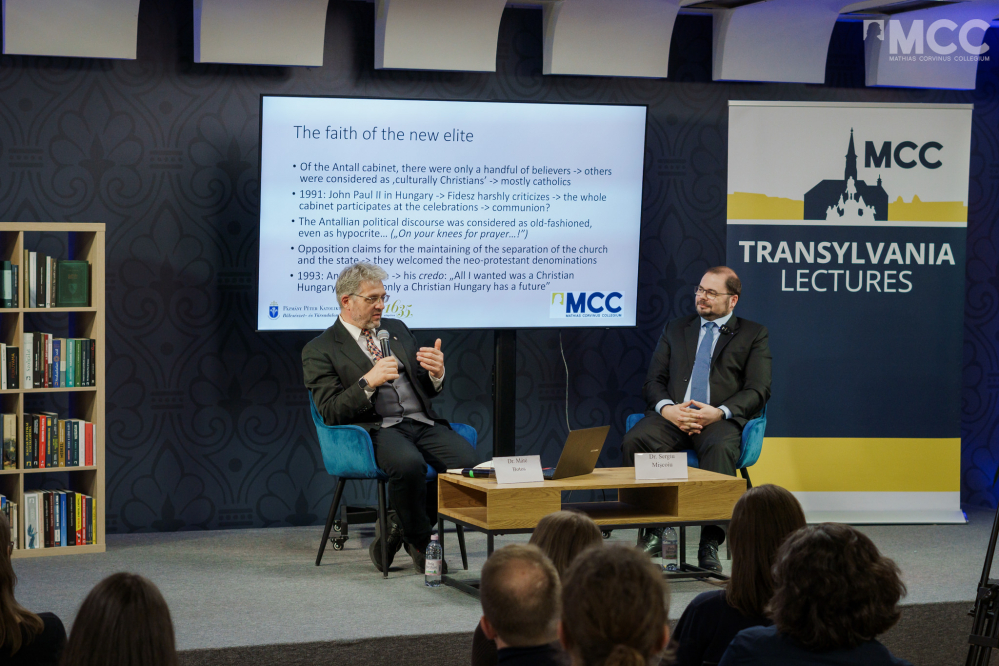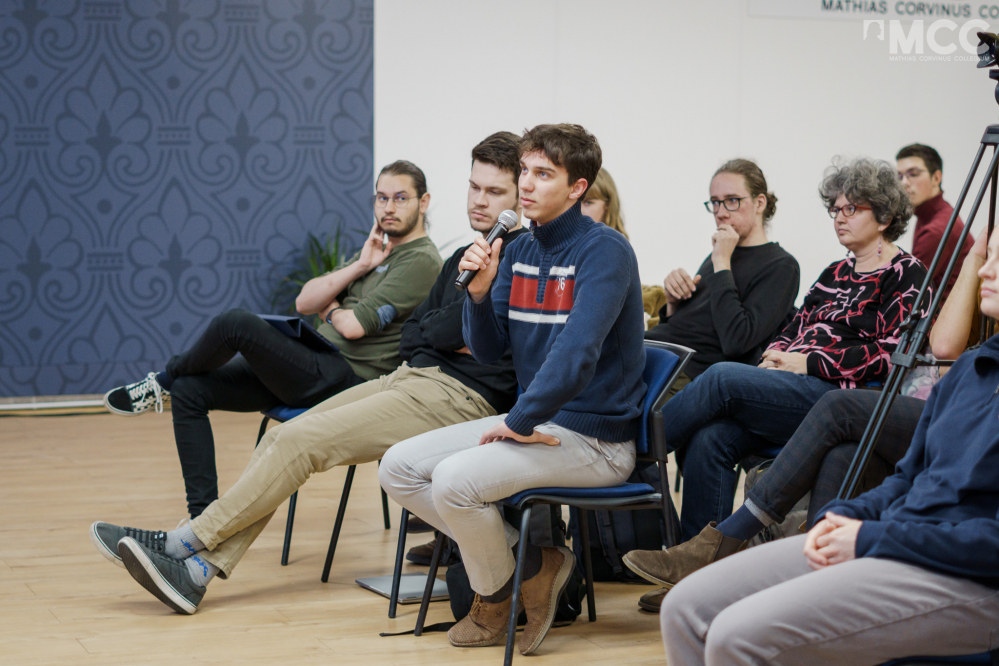Reading time: 5 minutes
At the latest event of the Transylvania Lectures series on 19 March, Dr. Sergiu Mișcoiu, historian, professor of political science at the Faculty of European Studies of the Babeș-Bolyai University, and Dr. Máté Botos, archaeologist, historian, head of the Department of Political Science at the Pázmány Péter Catholic University, director of MCC Press, discussed the roots, development and impact of Christian democracy on European societies.
At the event in Kolozsvár/Cluj, Kyra Hosu, a student of the MCC's University Program, welcomed the participants. The two experts' comprehensive analyses gave the audience an insight into the parallel development of Christian democracy in Romania and Hungary, as well as the different ways in which the principles of Christian democracy are interpreted in different parts of the world. They also analysed the interesting current situation: Christian democracy has become a stable political force in Hungary, despite the low religiosity rate, meanwhile, in Romania, one of the most religious countries in Europe, it does not carry so much political weight.
Sergiu Mișcoiu looked back at the beginnings of Christian democracy: in its simplest definition, it is an ideology that places moral Catholicism in a pluralistic context. The expert stressed that these principles can only exist in a democracy that is truly pluralist, and not only nominally so. Its spiritual roots go back to the era of urbanisation and industrialisation in the late 18th and early 19th centuries, and it emerged alongside the expansion of socialism and nationalism. With Christian democracy, the Catholic Church tried to counter the spread of socialist trade unions and the prerogatives of the nation state, resulting in a combination of political and social Catholicism. European communities formed, at least in part, thanks to this ideology.
The historian also summarised the evolution of Christian democracy in Romania. Here too the roots go back to the Roman Catholic Church. The establishment of the Greek Catholic Church in Transylvania was aimed at rapprochement with the Vatican and the West, but in the 20th century, despite previous intellectual movements, it was eventually dismantled. After the change of regime, the peasant party was re-established under the name Christian Democratic National Peasants’ Party, but by the 2000s it had failed to renew itself sufficiently, became unpopular and there have been no attempts to revive the ideology since. As Sergiu Mișcoiu pointed out, today it is the representatives of the Romanian far right who (falsely) claim to be Christian and democratic. The expert believes that the failure of the peasant party could have led to the current unpopularity of Christian democracy and the strengthening of the far right.
Máté Botos went on to describe the events in Hungary from the perspective of Christian democracy. After forty years of communist rule, it was difficult to rebuild democracy - during this time Christian democrats had no chance to develop as they did in the West, so they had to start from scratch. Here, the communist regime forced secularisation, it did not spread as a natural process, as a result of individual motives, as in the West, and the Catholic Church wasn’t as resistant as in Poland.
The victory of the conservative MDF led by József Antall in 1990 marked the beginning of a new era: conservatism stood for a strong respect for Catholic traditions, and Antall himself showed a strong commitment to Catholic culture - not religiosity, but the principles. Later, in the culturally Calvinist Viktor Orbán and Christianism, the older generation saw anti-communism itself, and many believers also supported him because he had already defined himself as a Christian when it was not to his advantage. Since 2010, Christian values and traditions have been guaranteed by the constitution in Hungary. Today, the religious practices are openly supported and celebrated by politicians, the faith in God remains a private sphere. The respect of Christian values is expressed in secular terms, in laicised form, but politics is devaluating religion in the eyes of young voters.
But is there a future for Christian democracy in Europe? According to Sergiu Mișcoiu, there are two possible answers: if the political system of the middle of the last century is attached to it, it has no place in today's public life; but if Christian democratic principles are incorporated into the various political movements of today, it has a good chance of taking hold. The ideology can reinvent itself by working with moderate elements of social democracy, moderate conservatism. However, radicalisation, the use of Christian messages by the far right, could have serious repercussions at a European level.
Máté Botos explained that Christian democracy is a European invention, and with the spread of the Catholic Church, the ideology is also gaining strength in different parts of the world, such as Africa and Asia. "It is a continuous transformation, we are losing some elements and creating new ones," he added. The European paradigm covers the traditional Catholic views of the 19th century, but in other parts of the world these principles may be interpreted in a very different way. So Christian democracy has a future, but not necessarily in the form we have known it so far.
The historians agreed that Christian democracy will need to renew itself to remain relevant in the 21st century, but it must do so without losing its values.






